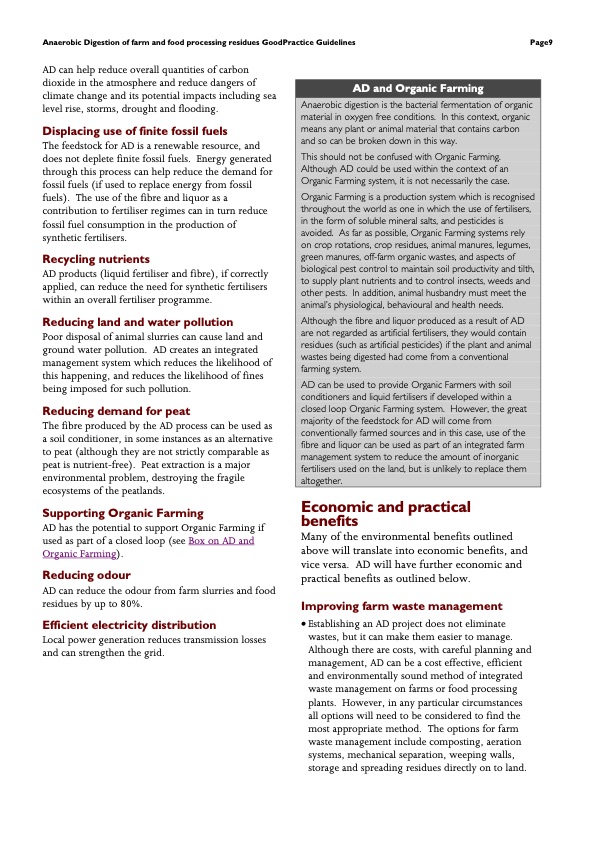
PDF Publication Title:
Text from PDF Page: 010
Anaerobic Digestion of farm and food processing residues GoodPractice Guidelines Page9 AD can help reduce overall quantities of carbon dioxide in the atmosphere and reduce dangers of climate change and its potential impacts including sea level rise, storms, drought and flooding. Displacing use of finite fossil fuels The feedstock for AD is a renewable resource, and does not deplete finite fossil fuels. Energy generated through this process can help reduce the demand for fossil fuels (if used to replace energy from fossil fuels). The use of the fibre and liquor as a contribution to fertiliser regimes can in turn reduce fossil fuel consumption in the production of synthetic fertilisers. Recycling nutrients AD products (liquid fertiliser and fibre), if correctly applied, can reduce the need for synthetic fertilisers within an overall fertiliser programme. Reducing land and water pollution Poor disposal of animal slurries can cause land and ground water pollution. AD creates an integrated management system which reduces the likelihood of this happening, and reduces the likelihood of fines being imposed for such pollution. Reducing demand for peat The fibre produced by the AD process can be used as a soil conditioner, in some instances as an alternative to peat (although they are not strictly comparable as peat is nutrient-free). Peat extraction is a major environmental problem, destroying the fragile ecosystems of the peatlands. Supporting Organic Farming AD has the potential to support Organic Farming if used as part of a closed loop (see Box on AD and Organic Farming). Reducing odour AD can reduce the odour from farm slurries and food residues by up to 80%. Efficient electricity distribution Local power generation reduces transmission losses and can strengthen the grid. Economic and practical benefits Many of the environmental benefits outlined above will translate into economic benefits, and vice versa. AD will have further economic and practical benefits as outlined below. Improving farm waste management • Establishing an AD project does not eliminate wastes, but it can make them easier to manage. Although there are costs, with careful planning and management, AD can be a cost effective, efficient and environmentally sound method of integrated waste management on farms or food processing plants. However, in any particular circumstances all options will need to be considered to find the most appropriate method. The options for farm waste management include composting, aeration systems, mechanical separation, weeping walls, storage and spreading residues directly on to land. AD and Organic Farming Anaerobic digestion is the bacterial fermentation of organic material in oxygen free conditions. In this context, organic means any plant or animal material that contains carbon and so can be broken down in this way. This should not be confused with Organic Farming. Although AD could be used within the context of an Organic Farming system, it is not necessarily the case. Organic Farming is a production system which is recognised throughout the world as one in which the use of fertilisers, in the form of soluble mineral salts, and pesticides is avoided. As far as possible, Organic Farming systems rely on crop rotations, crop residues, animal manures, legumes, green manures, off-farm organic wastes, and aspects of biological pest control to maintain soil productivity and tilth, to supply plant nutrients and to control insects, weeds and other pests. In addition, animal husbandry must meet the animal’s physiological, behavioural and health needs. Although the fibre and liquor produced as a result of AD are not regarded as artificial fertilisers, they would contain residues (such as artificial pesticides) if the plant and animal wastes being digested had come from a conventional farming system. AD can be used to provide Organic Farmers with soil conditioners and liquid fertilisers if developed within a closed loop Organic Farming system. However, the great majority of the feedstock for AD will come from conventionally farmed sources and in this case, use of the fibre and liquor can be used as part of an integrated farm management system to reduce the amount of inorganic fertilisers used on the land, but is unlikely to replace them altogether.PDF Image | Anaerobic Digestion Of farm and food Processing residues The development of a sustainable industry

PDF Search Title:
Anaerobic Digestion Of farm and food Processing residues The development of a sustainable industryOriginal File Name Searched:
biogas10.pdfDIY PDF Search: Google It | Yahoo | Bing
Capstone Turbine and Microturbine: Capstone microturbines used and new surplus for sale listing More Info
Consulting and Strategy Services: Need help with Capstone Turbine, sizing systems, applications, or renewable energy strategy, we are here to assist More Info
Container Lumber Dry Kiln: Since 1991 developing and innovating dry kilns using standard shipping containers More Info
Supercritical CO2 Lumber Dry Kiln: Compact fast drying in 3 days or less for small amounts of wood and lumber drying More Info
BitCoin Mining: Bitcoin Mining and Cryptocurrency... More Info
Publications: Capstone Turbine publications for microturbine and distributed energy More Info
FileMaker Software for Renewable Energy Developing database software for the renewable energy industry More Info
CO2 Gas to Liquids On-Demand Production Cart Developing a supercritical CO2 to alcohol on-demand production system (via Nafion reverse fuel cell) More Info
Stranded Gas for low cost power Bitcoin Mining Using stranded gas for generators may provide breakthrough low power costs for cryptocurrency miners. More Info
| CONTACT TEL: 608-238-6001 Email: greg@globalmicroturbine.com | RSS | AMP |